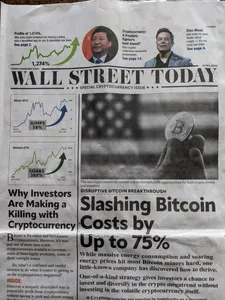The Bank of Central African States (BEAC) has expressed surprise at the CAR's choice, saying that they only learned about it along with the rest of the public. Two former prime ministers of the CAR co-authored a letter stating that adopting Bitcoin as legal tender without guidance from the BEAC was a "serious offence".
Central African Republic adopts Bitcoin as legal tender
Scammers create fake Louis Vuitton NFT project
The project airdropped these NFTs to NFT whales, causing some trackers used by people who follow and imitate whales' behavior to believe the whales themselves had minted the NFTs. The site then used a random counter to make it appear that the NFTs were quickly selling out, causing people to quickly mint their NFTs in fear of missing out. One NFT collector recounted her experience falling for the scam, buying five of the NFTs for a total of 0.6 ETH (~$1700) in hopes of striking it rich on a newly-launched project before it became widely known.
An examination of the website source code shows that the project is reusing code from a different scam based around World Cup themed NFTs.
Representative Madison Cawthorn faces accusations of insider trading and disclosure violations related to Let's Go Brandon coin
Fidelity plans to allow people to put retirement savings into Bitcoin
The Employee Retirement Income Security Act of 1974 requires plan fiduciaries to act solely in the financial interest of plan participants, and the U.S. Department of Labor issued guidance in March reminding plan fiduciaries of this duty, urging them to "exercise extreme care before including direct investment options in cryptocurrency". In a blog post shortly after, the DoL wrote that they had "serious concerns" about plans that would expose participants in cryptocurrencies and related products, outlining risks including valuation concerns, obstacles to making informed decisions, price volatility, and a still-developing regulatory landscape.
A Fidelity executive said that the company "believe[s] they should withdraw that guidance".
MetaDocs NFT project wants TikTok-famous doctors to diagnose you, but they don't have a license
Whether they actually get close to that dream very much remains to be seen. The project has faced several setbacks, including complaints from doctors whose likenesses were used without permission, and lack of any telemedicine license that would allow doctors to actually provide remote medical services. The project has also faced criticism for hosting "Ask a Doc" chats where physicians answered various questions without clarifying they weren't providing medical advice, for listing "physicians" in their whitepaper who were still completing residency, and for pledging to donate its first $1 million in revenue to an autism-related charity which has promoted the false claim that vaccines cause autism and has described autism as a disorder that needs to be "cured".
Reggie Fowler pleads guilty to fraud in Crypto Capital case
After initially rejecting a plea offer that would have allowed him to plead guilty to one felony if he forfeited up to $371 million, Fowler ultimately decided to enter an open plea to the charges against him and skip a trial. He pled guilty to five charges: bank fraud, conspiracy to commit bank fraud, operating a money transmitter business, conspiracy to operate a money transmitter business, and wire fraud. Fowler faces a maximum sentence of 90 years in prison.
FTX founder Sam Bankman-Fried tries to explain yield farming and it's just a ponzi
Levine responded, "I think of myself as like a fairly cynical person. And that was so much more cynical than how I would've described farming. You're just like, well, I'm in the Ponzi business and it's pretty good."
- "FTX/ Defi: If it looks like a duck and quacks like a duck . . . ", Financial Times
133 NFTs valued at $2.4 million stolen when hacked Bored Apes Instagram advertises fake land airdrop
The post invited people to visit a website that prompted users to connect their wallets in order to receive the airdrop. Users who did so found their NFTs transferred out of their wallet to the scammer. So far, 44 people have fallen for the scam site, transferring a total of 133 NFTs with an estimated value of around $2.4 million. The stolen NFTs included items from pricey collections including Bored Apes, Mutant Apes, Bored Ape Kennel Club, and CloneX. Several of the NFTs had previously been sold for over $100,000 each.
- Tweet by Bored Ape Yacht Club
- Scammer wallet on Etherscan
Epoch Times writers mass-mail unsolicited "newspaper" promoting crypto
Byrne and Collins published the paper via their co-founded company Streetlight Equity. The firm has also published ostensibly economic-focused articles that include conspiracy theories about how U.S. sanctions on Russia are all a part of a plan to "force the left's green agenda", and rail against pandemic lockdowns.
This is not the first unsolicited newspaper from the Epoch Times or its associates; the Falun Gong-associated and strongly anti-Chinese Communist Party publication previously distributed an unsolicited "special edition" which described COVID-19 as the "CCP virus". This led to pushback from Canadian postal union, who urged the Canadian government to ban its distribution as hate speech they feared would endanger Asian Canadians. Epoch Times have also spread QAnon and anti-vaccine conspiracy theories, spread false claims of fraud in the 2020 United States presidential election, and promoted far-right politicians in Europe.
Binance gave Putin regime information on users who donated to opposition leader Alexei Navalny
Navalny has been imprisoned in Russia since returning in January 2021, shortly after recovering from poisoning: an attempt on his life reportedly ordered by Putin. While in prison, Navalny's foundation has encouraged people to donate cryptocurrency using Binance. They have raised more than 670 Bitcoin ($28 million) so far, despite the Russian government outlawing the foundation and labeling it a terrorist organization. Donors to Navalny's cause now face potentially serious danger as they've been identified to the Putin regime by Binance.
Crypto proponents have long promoted the technology's potential to fund individuals who are targeted by oppressive regimes, and to allow anonymous and untraceable donations.









